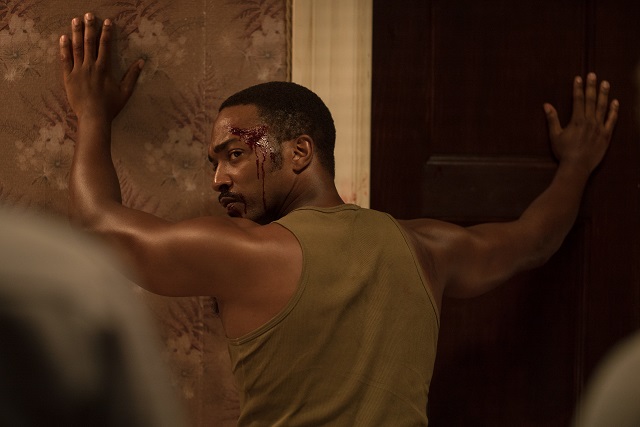These Lives Mattered: 'Detroit' Stumbles Under Its Own Weight... But Still Hits A Nerve
By Joel Wicklund in Arts & Entertainment on Jul 28, 2017 2:30PM

Anthony Mackie in "Detroit." (Photo courtesy of Annapurna Pictures.)
Despite problems with both style and structure, Detroit ends up being a moving and properly distressing view of America's ongoing police crisis. Though recounting events from 50 years ago, the story feels as fresh as the latest headlines of police cover-up allegations or protest-inspiring officer acquittals.
Anyone who responds to the urgency of the Black Lives Matter movement with historically tone-deaf slogans like "all lives matter" would be well served to read up on the case Detroit dramatizes. In the aftermath of the city's 12th Street uprising in the summer of 1967, shots coming from the Algiers Motel led some police and National Guardsmen to believe a sniper was in the motel. Some witnesses said the shots were from a starter pistol (using blank caps) fired by one of the occupants—a prank aimed at an oppressive law enforcement presence. No real gun was ever found by police, but three unarmed young men were shot to death as the motel was searched and guests were interrogated.
In subsequent court cases (the movie seems to coalesce several into one), three police officers were acquitted on murder, assault and conspiracy charges, even though two of the cops had previously confessed (their testimony later ruled inadmissible on the basis that they had not been advised of their rights). In the midst of the nation's civil rights turmoil, to many the event symbolized entrenched racial injustice.
In trying to portray how the city's massive riots led to the Algiers Motel incident, director Kathryn Bigelow and screenwriter Mark Boal immediately throw viewers into Detroit as urban war zone. Following a brief animated prologue broadly charting the simultaneous rise of urban migration and institutional racism, we hit fiery, bullet-ridden streets.
The gambit to start Detroit at such a high pitch doesn't pay off. While the intensity is vivid, the characters of the large ensemble drama are not. They are introduced in fleeting moments and don't register strongly until the story moves fully to the Algiers. On top of that, Bigelow and cinematographer Barry Ackroyd employ pummeling, restless, hand-held camerawork that, combined with rapid-fire editing and excessive close-ups, makes the movie's frenetic quality grow wearisome.
Bigelow used a similar docudrama technique in her last two features, The Hurt Locker and Zero Dark Thirty (both scripted by Boal), but in each there was more visual balance from scene to scene, particularly in Zero Dark Thirty where some profoundly expressive images were worked into the ultra-realistic framework.
While Detroit's ragged look can be bluntly effective, at its best it's not distinguishable from many other movies made in the same style (Captain Phillips, also shot by Ackroyd, comes immediately to mind). At its worst, it looks like an episode of NYPD Blue. One certainly hopes that in the wake of her history-making Oscar for The Hurt Locker, Bigelow (the first woman to win the Best Director trophy), isn't permanently leaving the artfully crafted imagery of earlier films like Near Dark and Point Break behind in favor of rote realism.
Similarly Boal, whose characters were strong narrative centers for complicated war sagas in his previous films with Bigelow, seems less adept trying to give multiple characters equal weight. In a chaotic story like this, a single dominant point of view would have enhanced the emotional impact.
But the impact does come. Detroit finds its footing as the Algiers incident builds to a boil. The characters finally flower during the crisis, aided by a cast made up largely of impressive up-and-comers. John Boyega (Star Wars: The Force Awakens) conveys the crumbling confidence of a failed peacemaker as a security guard who stands by as the cops run amok; Will Poulter expertly captures the near-psychotic self-righteousness of the racist cop leading the abuses; and Hannah Murray shines as the more defiant of two young white women also rounded up and degraded in the Algiers. There are also strong turns by actor/singer Jacob Latimore (Sleight) and movie veteran Anthony Mackie.
The cast member who should garner the most attention is the relatively unknown Algee Smith. He plays Larry Reed, lead singer of the R&B vocal group The Dramatics ("Whatcha See Is Whatcha Get"). As the movie tells it, Reed left the band before they broke big largely due to the trauma and anger that consumed him after the Algiers incident. With Smith's superb portrayal of Reed, Detroit finds its most resonant representation of the heavy psychological toll of the events. You only wish there was more of him in the film.
Still, in showing Reed's soul as bruised and battered as his body, Detroit brings together its splintered elements and reminds us why we have to remember the Algiers incident and its victims. As the deaths of Laquan McDonald, Freddie Gray, Sandra Bland, Eric Garner and others prove...we have not come that far in 50 years.
Detroit. Directed by Kathryn Bigelow. Written by Mark Boal. Starring John Boyega, Will Poulter, Algee Smith, Jacob Latimore, Hannah Murray, Jack Reynor and Anthony Mackie. 143 mins. Rated R.
Now playing in Chicago, New York City, Los Angeles, Washington D.C., San Francisco and other select cities. Opens nationwide on August 4.